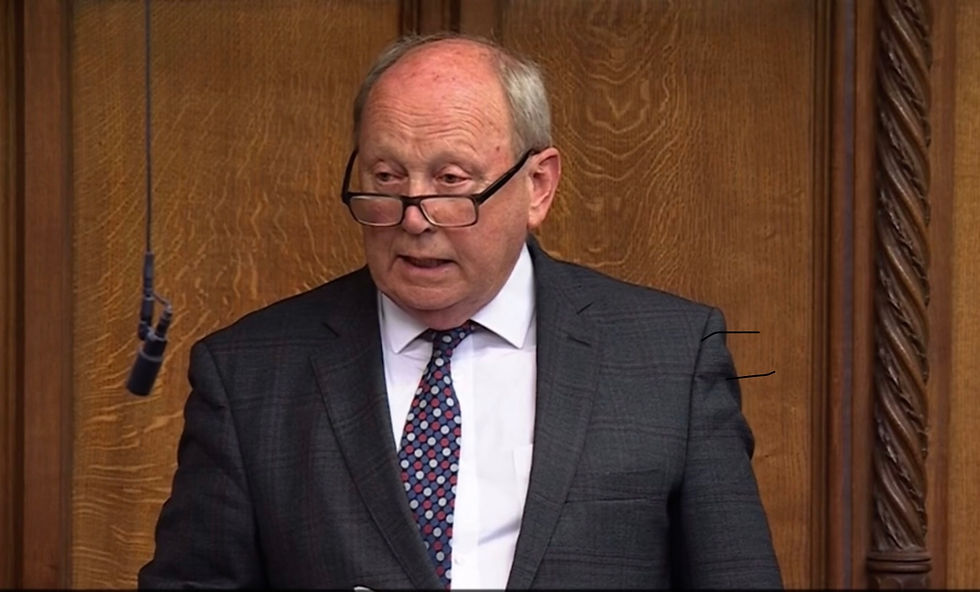Jim Allister condemns Equality Commission for ‘cheerleading trans activism’ after Supreme Court ruling
- Love Ballymena

- Jul 1, 2025
- 4 min read

TUV MP for North Antrim, Jim Allister
TUV MP Jim Allister has accused the Equality Commission for Northern Ireland (ECNI) of placing ideology above legality in the wake of a UK Supreme Court judgment affirming that legal definitions of ‘man’ and ‘woman’ are based on biological sex.
Mr Allister tabled an Early Day Motion in the House of Commons today, Tuesday 1 July 2025, voicing “deep dismay” at what he claims are attempts by the Equality Commission to undermine the UK’s highest court.
The move comes as the Commission publishes a new legal paper in response to the landmark For Women Scotland Ltd v The Scottish Ministers ruling, setting out its roadmap for addressing what it calls “significant legal uncertainties” in the Northern Ireland context.
Allister: “Biological reality cannot be wished away”
In a strongly worded statement, the North Antrim MP said:
“The Supreme Court could not have been clearer: biological sex—not self-declared gender identity—is what determines whether someone is legally considered a man or a woman for the purposes of the Equality Act. This is not a matter of personal opinion or political fashion; it is settled law.”
He accused the Equality Commission of seeking to bypass this legal clarity:
“Astonishingly, we now see the Equality Commission exploring ways to circumvent that ruling—an action which, in my view, is legally indefensible and ideologically driven.”
Mr Allister warned of the consequences for democracy and legal certainty:
“The Commission is meant to be a neutral enforcer of equality law, not a cheerleader for trans activism. Its role is to uphold the law as it stands, not to reinterpret it in line with fringe ideology. When a statutory body—funded by the public purse—starts behaving as if it is above the UK’s highest court, then democracy and legal certainty are both placed in jeopardy.”
He added:
“There must be no ambiguity: the Supreme Court ruling applies fully in Northern Ireland. Any suggestion otherwise is an affront to the rule of law and to the constitutional order of the United Kingdom. Devolution does not give license to ignore the UK’s apex court or to rewrite legislation by stealth.”
Mr Allister concluded:
“This is why I have tabled this motion—to send a clear message to the Equality Commission and to any other public body tempted to place ideology above legality: the law is not optional. Biological reality cannot be wished away. And the rights of women—based on sex, not gender identity—must be defended without compromise.”
The Motion: A warning to public bodies
The MP’s Early Day Motion, titled “NI Equality Commission and Supreme Court ruling”, reads:
“That this House expresses dismay at the attempts by the Equality Commission in Northern Ireland to find ways to circumvent the very clear ruling by the Supreme Court on biological sex being the determinant in regard to the terms ‘woman’ and ‘man’; regrets that the Commission has allowed itself to become a vehicle for pro-trans ideology; and repudiates the suggestion that the Supreme Court ruling might not be followed in Northern Ireland.”
Equality Commission responds: “The situation in NI is more nuanced”
In contrast, the Equality Commission published a legal paper the same day, laying out a cautious but detailed approach to navigating the implications of the Supreme Court’s decision.
The paper highlights Northern Ireland’s unique legal framework, particularly in light of Article 2 of the Windsor Framework, which the Supreme Court ruling did not address.
Chief Commissioner Geraldine McGahey said:
“After much consideration and analysis, the Commission has concluded that the situation in Northern Ireland, in respect of this matter, is much more nuanced and complicated, and there is significant uncertainty due to our unique legal landscape.”
She continued:
“We have no interest in merely speculating as to how a court might determine these issues in the future… It is important that the Commission shows leadership as people and their lives are at the heart of this issue.”
The Commission’s plan includes:
Seeking a court declaration to clarify several outstanding legal questions;
Issuing Pre-Action Protocol letters to government departments and public bodies;
Launching a public consultation with stakeholders;
Publishing interim guidance for employers and service providers.
McGahey emphasised the Commission’s intention to reduce legal risk and avoid “toxicity” in the debate:
“Ultimately, maximising legal certainty and transparency is at the heart of our strategy… We hope to avoid the toxicity which has sometimes characterised the debate around how to balance the rights of biological women and transgender women by creating a space for debate and adjudication by the courts.”
Next steps
As the legal and political fallout continues, the Commission’s proposal to bring the matter before the courts sets the stage for further clarification—potentially through a formal judicial declaration on how the Supreme Court’s ruling applies within Northern Ireland’s legal landscape.
Meanwhile, Jim Allister’s intervention signals growing pressure from some political quarters to draw a firm line on the definition of sex in law and ensure uniform interpretation across all parts of the United Kingdom.
The unfolding legal process is expected to have wide-ranging implications for equality law, public service delivery, and the rights of both women and transgender individuals across Northern Ireland.








